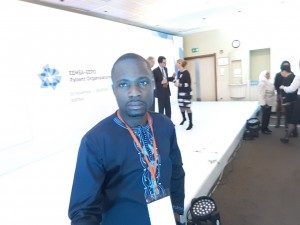
By Christine Kukka
The HIV/AIDS epidemic, ebola and malaria have infected and killed millions in Sub-Saharan Africa , but another infection, more silent and insidious, has also destroyed millions of African lives yet has received little attention from the global community—hepatitis B.
A recent article in The Lancet medical journal estimates that between 5 and 20 percent of the 1 billion Africans in this region have been infected with hepatitis B and 5 percent are chronically infected.
The region lacks the healthcare workers and resources to educate, screen and immunize people for hepatitis B, and there are few medical centers or drugs available to treat those infected. In a cruel twist of fate, many people find out about their hepatitis B when they attempt to donate blood.

“It was on one fateful day in 2007, during my second year in college, when I decided to donate blood to help save the lives of pregnant mothers who undergo complications during deliveries,” wrote one young man who now works with the Hepatitis Foundation of Ghana. “Everything was OK, until the lab technician called out my name and told me they cannot let me complete the processes because my blood was ‘incompatible.’ He later handed me a fact sheet on hepatitis and requested that I read it thoroughly,” he recalled. “I felt so confused and didn’t know what to do. I thought I would be referred to see a physician for counseling but no, nothing. Not knowing what to do, I decided to educate myself.”
He went online and read several articles about hepatitis B. He learned the importance of avoiding alcohol and smokin and eating healthy foods. “In 2009, I took another test that revealed I was in the chronic stage of the infection,” he recalled. “Even the health professionals at that facility couldn’t explain what that really meant. I was confused and didn’t know if I was going to die or not.”
A year later, he had another test that showed the infection was not currently causing any liver damage. “I live in a community and country where the level of awareness about hepatitis is very low,” he explained. “The majority of the people are ignorant about the situation. I have lost some family members as a result of the disease.”
His research led him to the foundation in Ghana. “I no longer feel left alone. I now feel I have someone whom I could call upon for any information or seek clarification concerning my situation. Not only me, but for my community too,” he wrote.
The foundation, established by Theobald Owusu-Ansah, is attempting to educate people about hepatitis B to stop an infection that is killing thousands in Ghana. In Africa, hepatitis B is commonly spread during childbirth, through re-used syringes due to scarce medical resources and sexually. A lack of knowledge about hepatitis B and how it is spread, especially among healthcare workers and midwives, has also helped spread the disease.
Owusu-Ansah established the foundation in 2007 after four of his family members died from hepatitis B. He realized he had to take action to educate people about this deadly infection and get better treatment for people living with hepatitis B. Here is his story about a young woman diagnosed while attending nursing school.

“Initially, someone had put her on some herbal preparations and told her they would cure her ailment after she was first diagnosed with hepatitis B,” he recalled. Owusu-Ansah spent hours educating her about hepatitis B and she went for tests, which revealed she had liver damage. She was referred to a physician who prescribed the antiviral tenofovir (Viread) and recommended regular monitoring. After several months of treatment, her liver was healthy and her viral load was undetectable.
Years passed, she married and became pregnant. Osusu-Ansah reminded her that her babies would be protected against hepatitis B if they immediately received the first dose of the hepatitis B vaccine and HBIG within 12 hours of birth.
But things went wrong. She had stopped taking tenofovir. Her midwife gave her an herbal remedy for hepatitis B and told her the vaccine would be enough to protect the baby. It wasn’t, the baby became infected. The mother was devastated.
“Her story is not so different from many others’ experiences in some parts of Ghana,” he explained. “The unavailability of HBIG and the vaccine is challenging, and even when they are available, very few can afford them.”
In Ghana, and many other regions of Africa, the only vaccines available for free are combination (pentavalent) vaccines that contain vaccines for hepatitis B, diphtheria and other diseases. While economical, these combination vaccines cannot be administered until a baby is at least six weeks old, which is too late to prevent mother-to-child infection.
To break the infection cycle, a single dose (monovalent) hepatitis B vaccine must be administered within 12 hours of birth.
“I believe something can be done about this,” said Owusu-Ansah. “With government support, we need to expand our education campaigns to cover rural areas and take the message of hope to their doorsteps.”
For more information about the Hepatitis Foundation of Ghana, visit its website or email theobald2003@yahoo.com.

